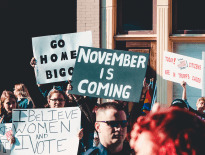
Responding Healthily to the Rhetoric of Denial and Fear: Coronavirus
I’ve seen great pieces in recent days with titles like “you can’t gaslight a virus.” Sadly, you can muddy the rhetorical waters around it big time though–and that can enable its spread. And we’ve been seeing a lot of that from multiple sources, including the US government. A lot of times the rhetoric ends up ramping up the fear in response to the uncertainty of such an event. This blog post looks at the ways all of this happens and some quick and dirty communication concepts that are helpful for sorting through the rhetorical muck and being thoughtful, appropriately cautious, but not unduly fearful in response to the Coronavirus.
Disclaimer Before Starting: As you should know if you’ve been following this project, I’m not THAT kind of doctor, and to be honest, I’ve been sorting through so many different articles about this topic that I haven’t linked them all here. I link to some expert sources from health experts in the following, but while my area of research is health-adjacent, I mostly study the impact of stress and trauma on conflict communication. My work supplements and builds on health expertise, though, and I DO have a PhD in Communication, which helps me see the intersections between health and rhetoric and conflict.
Starting with Confessions, As I Was Taught to in Church
So I’m going to start by admitting that right here that a couple of weeks back on the Assertive Spirituality Facebook page, I minimized the Coronavirus by calling it “basically a glorified cold.”
I’m now deeply sorry about that.
My response at that time minimized the threat, and preemptively invalidated many valid fears people have about this disease that’s now been shown to be spreading more quickly than was expected. It especially minimized things for people with immunocompromised people in their families.
I deeply apologize for that. Your worries have good basis. Even with a low-percent death rate, many older and immunocompromised people are likely to die from this disease, and I ought not have minimized that.
This disease affects lives. Real lives. As various articles by experts have said, even if this is a mild to moderate pandemic, it may affect many lives. A healthy proactive response on both an individual and a systemic level could head off a lot of that.
My Response Was a Natural One.
I take accountability for the potential impact of my previous statement, absolutely.
That said, my response was a technique many of us use when things are distant, when we fear them—and a technique I’m seeing a lot of in the rhetoric around this disease.
It’s an attempt to manage something that may overwhelm us by flight, or running from a perceived threat. In this case, running from perceiving the impact something might have.
Natural, But Not Always Toward the Common Good
The problem, of course, is that the outcome of this kind of stress response can both hurt us and others, if it gaslights us or others to the realities of the situation—especially the genuinely threatening parts that health experts have good information for us about how to carefully and thoughtfully respond to to avoid risking more lives than necessary.
This post from the Smithsonion blog from health experts (recommended to me by a hospice nurse friend) is a great balanced, not overly anxious response to the threat, telling us—on an individual level—to prepare but not go overboard: washing hands, preparing to stay in our houses for a couple of weeks as needed, etc.
Meanwhile, it is entirely legitimate that we also take action and voice concerns about the lack of appropriate systemic preparedness due to poor functioning and misappropriation of funds driven by the current West Wing and enabled by the Senate.
The Kind of Active Response that Is Unhealthy
What my comment was responding to, however, is also a valid concern around Coronavirus. That is to say that those who are actively concerned about the virus are often taking it out on Asians, including Asian Americans who have never been near the virus.
In short, that is also a valid concern, and whatever fears you may have, those actions are NOT OKAY. If we’re talking likelihoods, it’s just as likely–possibly more likely–that the wealthy white businessman who lives on your block recently traveled to Asian areas with the coronavirus than the Asian Americans down the street who may have never been to Asia.
Don’t be a racist about the Coronavirus, and please speak up against it when you see such things! As I discussed previously, immigrants who look different are already being characterized as filled with disease these days, and the fear around Coronavirus is only making that worse for many. Don’t enable that toxic crap.
Denial Is Worse When Driven by People in Power
So yeah, ending that caveat, it’s important to note that if my individual denial may have had ramifications two weeks ago—probably, objectively, they caused much less then than they would have had now that the disease has moved into the US and has caused its first death here.
And as I’ve said, I apologize for my words, cast off quickly in the commentary of a single meme as they were.
But those ramifications pale in comparison to the words and systemic effects of the people now in charge of the government who are now responding to the situation–people who are not acting as neutral actors just trying to survive, but as voices of powerful systems they have been systematically and corruptly tearing down toward their own ends and those of their cronies.
When Devil Terms are Mixed with Denial, It’s a Powerful Brew
Indeed, the fact that the West Wing is trying to muzzle its experts while proclaiming that Coronavirus itself is a hoax is a form of extreme gaslighting of expertise that totally plays into the demonization of expertise (and its association with being out of touch and liberal, etc. etc. etc.) I’ve talked about these kinds of demonization here before.
As opposed to recognizing the problem and dealing with it, the current administration, which as I’ve said has underfunded the country’s pandemic response team and failed to hire many positions that would normally be ramped up to respond to a threat like this, is actually trying to get its own experts to stop from speaking out about the reality of the virus.
They are so busy trying to fight a shadow enemy and shift blame off themselves that they are actively harming many lives.
This is a problem on top of the existing problem with major ramifications.
You Can’t Gaslight a Virus—But You CAN Enable Its Spread
So here’s the thing. You might not be able to actually gaslight a virus (in other words, convince it that it doesn’t exist or that it won’t have an impact). But by failing to respond well to its spread, by underfunding government entities, muzzling experts, and calling it a hoax, thus convincing humans who listen not to take reasonable precautions, those in charge, whose voices have the most authority and rhetorical power, can enable its transmission.
And THAT is the kind of rhetoric that negatively affects lives—especially vulnerable lives—in major, major ways. That’s not at all cool.
We Must Speak Up Against This Toxic Crap
Supporting those who act this way is about to cause major damage to our most vulnerable populations in this country. And that’s really not okay.
I don’t know about you, but I’m working to repent of my former callousness by speaking up against this administration’s unreasonable actions. (I mean, that’s not a new thing, but this is a new example of why that’s so vitally important to public health–literally.)
And the thing is, I don’t have to pick and choose–I can BOTH speak up against the administration and remind us that we ought keep calm and avoid racism during this time. Both things can be important at once, and both parts of an evidence-based, multi-faceted message.
I will be voting for the person with the better actions and policies and rhetoric leading to the common good, sure. That’s really important. But in the meantime as well as in the future, I will also continue to do what I can to speak out and advocate for the common good in the meantime, and seek to call our governmental representatives to account.
The Factors in My Individual Response
On the individual level, as I’ve mentioned before, I have dealt with trauma in the past. That means my previous impulse toward denial regarding this threat had a neurobiological basis: my brain was trying to protect me from further anxiety and stress around this problem, and denial was the mechanism for that.
(Which doesn’t mean that I needed to communicate that outward toward others.)
My Own Version of the Serenity Prayer from a Stress Research Perspective 🙂
That doesn’t mean I have to use the stress energy for that purpose, though. Rather than giving in to the numbing, I plan to do my version of the famous Serenity prayer, based in stress and trauma research: I plan to work to grieve the parts of this situation I can’t affect, to channel the stress energy into changing the parts I can, and to keep calm and burn off the remaining stress energy through modes such as exercise as much as is reasonable.
These strategies are likely to help me feel calm and as healthy as possible while optimizing my positive impact and effectiveness, both on my own life and on others. And by reducing my own stress, they will also reduce the likelihood that I will be one of the immunocompromised group.
I recommend you do the same. And check in on your friends with anxiety disorders, if you can, as well as older folks and the immunosuppressed. Their stress may be higher right now, and that’s not great for the immune system. Recommend these techniques to them as well.
What I Can Do to Make Things Better
By saying I’m planning to do what I can, I’m not planning to go into unhealthy survivalist mode, mind you, or count my chickens before it reaches my area. But I will listen to the experts about the reasonable preparations I should be making myself as well.
Here’s that one more thing, though: I teach at a university, and that means I have a flexible schedule.
It’s not ideal if I get sick for a week or two, mind you, but I COULD adapt and teach my classes through online discussions if I needed to. I could self-quarantine and such. (I could also run this project from home—I do anyway!)
Advocating for Politicians with Better Labor Policies
A lot of people have jobs and lives that make that kind of thing exceedingly difficult for them. The kinds of labor policies in this country are likely to risk the spread of the virus.
See, many people will have to show up to work no matter what. And many don’t have the money to stock up on goods for two weeks in advance, either, because of how poorly they are paid.
And that’s a common good sort of problem as well. Something also to take firmly in mind when you’re voting in this coming election.
A Final Charge
Go team #AssertiveSpirituality! Let’s continue to do what we can where we are with what we’ve got to overcome both denial and over-anxiety, and to keep doing what we can to speak up against the rhetorics and policies that promote these things and create further reason for fear. Let’s keep working for a literally healthier world for us all. Let’s do this thing.
And—friends?—please wash your hands. Thoroughly and longer than you usually do. (And maybe lay in some hand cream for the inevitable chapping, eh? We can do this thing.
Some Resources To Help You with Speaking Up
And please spread the reasonable word about how to respond to this epidemic, please? If you’re looking for memes to share online, we’ve scheduled some of those on the Assertive Spirituality Facebook page just for you on this topic this week.
And if you’re looking to speak up and need help dealing with the conflict that results, make sure to sign up for our weekly email newsletter in the top bar or by commenting on this article. If you do so, we’ll send you the “Assertive Spirituality Guide to Online Trolls” for free once you’ve confirmed your email address. It will help you deal with conflict both online and off when addressing issues. You can unsubscribe at any time, but we hope you’ll stick around.

